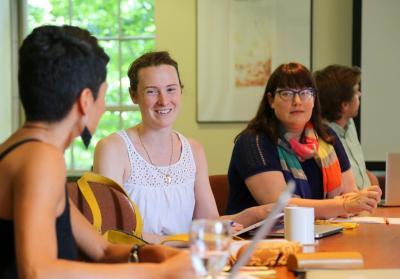Digital Humanities Summer Fellowships

The Simpson Center offers annual summer fellowships for faculty and graduate students to pursue research projects that use digital technologies in innovative and intensive ways and/or explore the historical, social, aesthetic, and cross-cultural implications of digital cultures. The program has three primary goals:
- To animate knowledge—using rich media, dynamic databases, and visualization tools
- To circulate knowledge—among diverse publics
- To understand digital culture—historically, theoretically, aesthetically, and generatively
The Simpson Center gratefully acknowledges the support of a National Endowment for the Humanities Challenge Grant and the Andrew W. Mellon Foundation as well as many donors to the endowment which is underwriting these fellowships.
2025 - 2026 Digital Humanities Summer Fellows








2021 - 2022 Digital Humanities Summer Fellow

Juliet Shields (she/her/hers)
Nineteenth-Century Scottish Novels Database
The Nineteenth-Century Scottish Novels Database makes available some of the hundreds of once popular novels written by Scottish writers during the nineteenth century that have fallen out of print and into obscurity. Scholars of Scottish literature have struggled to assert its importance against more dominant English and American canons. This effort has led them to over-emphasize Scottish literature’s major figures—Robert Burns, Walter Scott, and Robert Louis Stevenson—at the expense of less well-known writers, particularly women writers. My open-access database will make available novels by some of these writers, facilitating scholarly discussion and public awareness of their work.